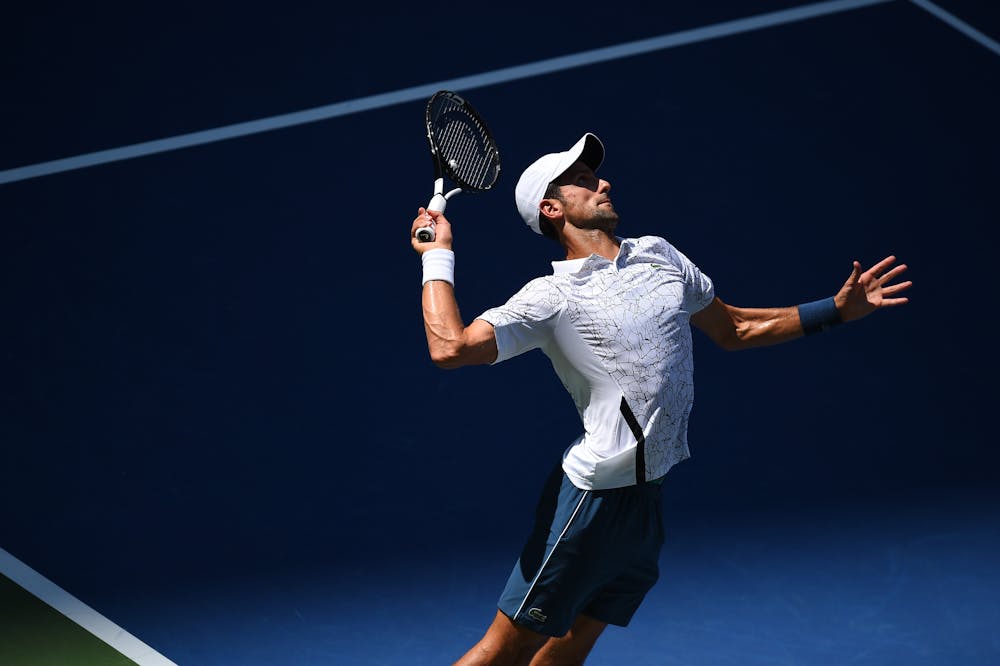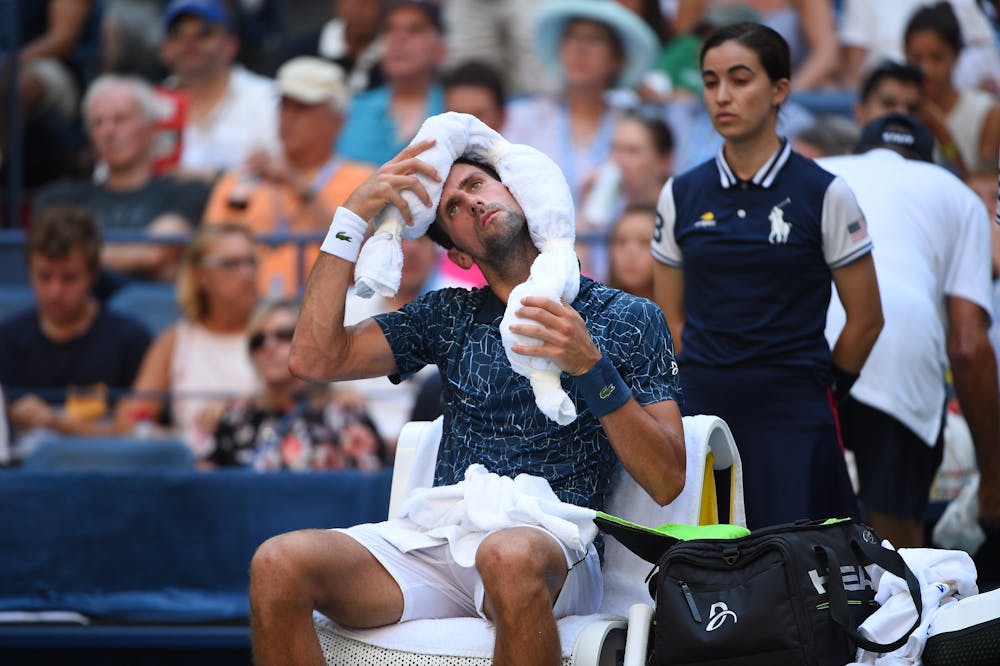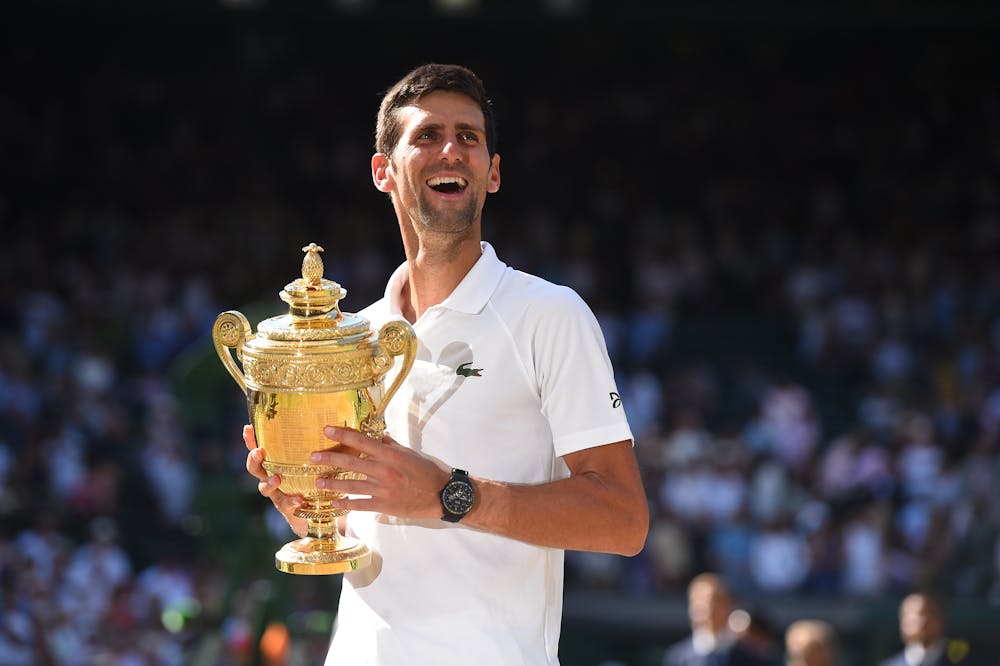Look at the scoreline and you will see another day at the office for 13-time Grand Slam champion Novak Djokovic. A fifth straight-sets victory over Portugal’s Joao Sousa, 6-3 6-4 6-3. An unblemished fourth-round record at the US Open extended to 11-0. A 66th win in New York, where he has never lost to an opponent ranked outside the top 50, wrapped up in exactly two hours.
Another day at the office for Novak?
A 66th win in New York for Nole, wrapped up in exactly two hours. That's what the scoreline says...

Survival of the fittest
All true – but only half the story for the two-time former champion at Flushing Meadows, who dragged himself through another sweltering contest on Arthur Ashe Stadium to book a place in the 42nd Grand Slam quarter-final of his career.
“It was much more difficult than the score indicated,” he said afterwards. “You know, I’m not 21 anymore – that was 10 years ago. I still don’t feel old, but at the same time there is a little biological clock that is not really working in your favour. Sometimes you just have to survive.”
Survival of the fittest? Those who saw Djokovic dragging his heels between points, disappearing to the locker room after the second set and doubled over in the third, pointing to his chest before taking a medical time-out, would have to say otherwise.
The bullet-proof conditioning of his late 20s is yet to return, and the stifling humidity within the windless cauldron of Arthur Ashe Stadium, intensified since the addition of its roof, took its toll on the Serbian once again, as it did against Marton Fucsovics in the first round.

In typical Djokovic fashion
Yet while Djokovic may not be the athlete he was in his all-conquering prime, his relationship with the sport appears healthier than ever. Much has been written about the tumult of his last three years on (and off) tour – the unbeatable displays in 2015; the sudden, stupefying slump that followed his 2016 Roland-Garros triumph, at which point he held all four majors; tears at the Rio Olympics; coaches fired, some re-hired; six months off, elbow surgery, and the slow route back up the rankings.
But in typical Djokovic fashion, he has teased the positives from those predicaments – notably the perspective gained, in large part due to the ever-increasing joys of fatherhood.
“It isn't like it used to be,” admits Djokovic, raising three-year-old Stefan and his daughter Tara, now 11 months, with wife Jelena. “When I got that blessing to become a father, things changed. You add more meaning and more purpose to your life, more responsibilities. There are things that make you happy even when you lose a tennis match.”
Contrast that with Djokovic’s recollection of his run to the 2016 US Open final, shared with ESPN on the eve of this year’s tournament. He won the opening set against Stan Wawrinka, but after losing the second and third, a new sensation hit him at the start of the fourth: in his words, he couldn’t hear the score. “I felt like, ‘Wow, I have to go through this again?’ I hit a wall, emotionally. As much as I was fulfilled with holding four slams at the time and being No.1 and at the pinnacle of my career, I was drained.”

"We are blessed to play the sport we love"
Now that there is more to life than tennis for Djokovic, it is no longer the chore it had seemingly become. He speaks in almost evangelical terms about his good fortune, even after winning despite wilting in the mid-afternoon heat in Queen’s.
“I prefer not talking about how difficult it is,” he insists. “We are blessed to play the sport that we love… I have worked for that, but I’m not the only one. There are thousands of players around the world that are part of this beautiful sport that want to compete on the biggest stage, to win Grand Slams. I was just very fortunate to win 13 of them.”
The latest, his Wimbledon triumph in July, ranks as his most cherished, as it was the first witnessed by young Stefan from the players’ box. It was also a watershed victory: his first title in over a year, after the sabbatical and the surgery.
“I felt huge relief… because of the period of last couple years before that, what I've been through with injury, inspiring myself to get back on the track and try to win majors and be one of the best players in the world.
“Being absent from the tour for six months allowed me to have time for reflection for, you know, taking a larger perspective at things and understanding how I want to come back to the tour, how I want to play. Things I wanted to always work on but never had time, I had time. Well, I haven't really played because of the elbow, but still I had time to reorganise my whole life. So I'm grateful for that opportunity.”
Work in progress
Nevertheless, Djokovic remains a work in progress. Reputation played its part in his victory over Sousa, the Portuguese trying to red-line his game in a bid to stun the Serbian, flattening his strokes and looking for the lines early in the rallies, but racking up errors rather than winners. It was a nervy display from the world No.68; With Djokovic at his lowest ebb trailing 40-0 early in the third, he hammered a forehand beyond an empty court after the Serbian had conceded the point. Sousa gave up six break points; Djokovic converted five.
As frustration ate away at his opponent, Djokovic provided a lesson in finding a path to victory in spite of his apparent physical distress. He didn’t look to paint the lines, focusing on depth instead. After a loose second set in which he gave up 10 of his 18 unforced errors, he refocused and cut that figure down to 3 in the third.
And having camped out deep behind the baseline for most of the second half of the contest, he sensed his moment at 3-4 in the third, stepping in to rip three consecutive down-the-line backhand winners to bring up the decisive break points as he claimed 12 of the last 15 points to seal victory. You might even call it vintage Novak.
Djokovic admitted he would try to catch some of Roger Federer’s fourth-round showdown with Australia’s John Millman – the Serb will face the winner in Wednesday’s quarter-finals, another stage at which he has never lost in New York – but only once the kids are asleep. “Those are the priorities. When you go back home there is no tennis No.1, it’s family No.1, so I have to see how that goes. And if I have time, obviously I’ll have a look.”
 ROLAND-GARROS
18 May - 7 June 2026
ROLAND-GARROS
18 May - 7 June 2026

